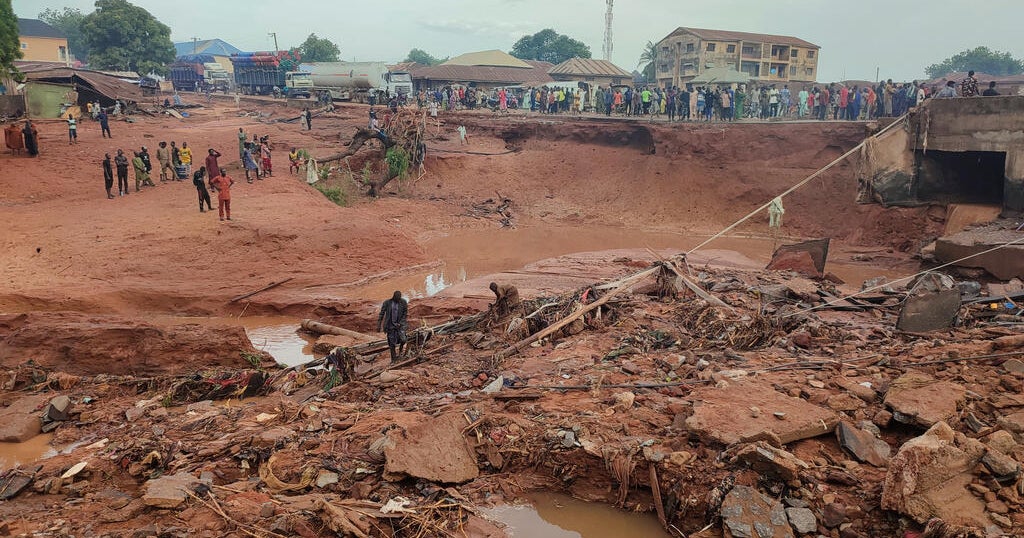In a tragic incident in north-central Nigeria, recent severe flooding has resulted in the loss of at least 151 lives, according to local emergency services. The flooding, which occurred in the town of Mokwa in Niger State following heavy rainfall, has displaced over 3,000 residents. The Nigerian government is responding by activating emergency services to aid the affected communities.
| Article Subheadings |
|---|
| 1) Overview of the Disaster |
| 2) Impacts on Local Communities |
| 3) Government Response |
| 4) Residents’ Reactions |
| 5) Future Precautions and Climate Challenges |
Overview of the Disaster
The flooding occurred in Mokwa, a town situated in Niger State, approximately 180 miles west of Abuja, Nigeria’s capital. Local emergency services reported that the heavy rainfall resulted in catastrophic flooding that claimed the lives of at least 151 people. This devastating event commenced on Friday night and continued into Saturday, with reports indicating that the situation has worsened in the region.
Public officials confirmed that over 3,000 individuals have been displaced from their homes, with emergency services indicating that more than 500 households were significantly affected. Conditions in Mokwa were dire, with reports detailing that many roofs barely remained visible above water, and residents were found waist-deep in floodwaters. The impact of this flooding has not only claimed lives but also caused extensive property damage.
Impacts on Local Communities
The flooding has severely impacted the local economy and the self-sustaining efforts of the community. Mokwa has long served as a vital meeting point for traders and farmers, primarily facilitating the sale of essential food items like beans and onions. However, recent reports show that many local farms have suffered extensive losses, further exacerbating the community’s challenges.
Residents have begun to voice their concerns about the hazards posed by flooding, particularly in a region that is often marked by prolonged dry spells. This recent event highlights the vulnerability of local agriculture and food supplies due to extreme weather conditions. Many farmers lost not only their crops but also the machinery necessary for production, further crippling the local economy.
Government Response
In response to the devastating flooding, Nigerian President Bola Tinubu announced the activation of the national emergency response center. The government’s primary objective is to assist affected communities as quickly and efficiently as possible. “Search-and-rescue operations are ongoing,” stated the president in a late-night message, emphasizing the importance of providing support to all affected individuals.
Federal agencies have been mobilized to work alongside state governments in the affected areas. Relief materials, including food and temporary shelter, are being deployed immediately to support the displaced individuals and families. This proactive approach demonstrates a commitment to ensuring that no Nigerian affected by this disaster is left behind or unheard of.
Residents’ Reactions
As recovery efforts unfold, residents of Mokwa are grappling with immense grief and loss. Many individuals have not only lost family members but also their livelihoods and possessions. Strikingly impactful was the sentiment expressed by resident Kazeem Muhammed, who mourned for numerous lives lost and lamented the destruction of local farms and property. This sentiment is echoed throughout the community, as fear mounts about the future implications of such floods.
Relatives of the deceased have begun searching for their loved ones, hoping for their safe return. As efforts to find missing individuals continue, the community remains steadfast in supporting one another, grappling with both emotional and physical losses. The resilience shown by the people of Mokwa highlights the human spirit in times of tragedy.
Future Precautions and Climate Challenges
Niger State is grappling with the increased frequency of extreme weather events, attributed to climate change. This incident has raised questions about the preparedness of local communities in the face of such disasters and what measures can be taken to mitigate future risks.
Officials and experts are debating possible long-term strategies that could be implemented to manage flooding risks. Educational programs that inform citizens about early warning signs of flooding and preparation techniques will be critical in fortifying the communities against such incidents. Furthermore, improving local infrastructure to better manage heavy rainfall and prevent flooding is essential for the safety and security of residents.
| No. | Key Points |
|---|---|
| 1 | Severe flooding in Niger State has resulted in over 151 confirmed deaths. |
| 2 | More than 3,000 residents have been displaced due to the disaster. |
| 3 | The Nigerian government has activated emergency response centers and deployed relief materials for affected communities. |
| 4 | Local residents have expressed grief over lost lives and livelihoods while awaiting news of missing loved ones. |
| 5 | Ongoing discussions around better flood management and preparation strategies are crucial for the future. |
Summary
The catastrophic flooding in Mokwa has not only highlighted the immediate human toll in terms of lives lost and families displaced but also raised pressing questions about climate change and preventative measures. The Nigerian government’s response, while crucial, further emphasizes the need for long-term strategies to protect communities against the impacts of increasingly severe weather. As recovery efforts continue, the resilience of affected residents is evident, showcasing both their grief and determination to rebuild.
Frequently Asked Questions
Question: What are the exact measures the government plans to implement for emergency response?
The government has activated emergency response centers, mobilized federal agencies, and dispatched relief materials like food and shelter to assist affected communities.
Question: How are local businesses affected by the flooding?
Local businesses, particularly those reliant on agriculture, have suffered immense losses, impacting the economy and food supply within the region due to damaged crops and infrastructure.
Question: What long-term solutions are being considered to prevent future flooding?
Officials are discussing strategies such as improved local infrastructure, education on flood preparedness, and community engagement initiatives to minimize risks associated with severe weather events.


